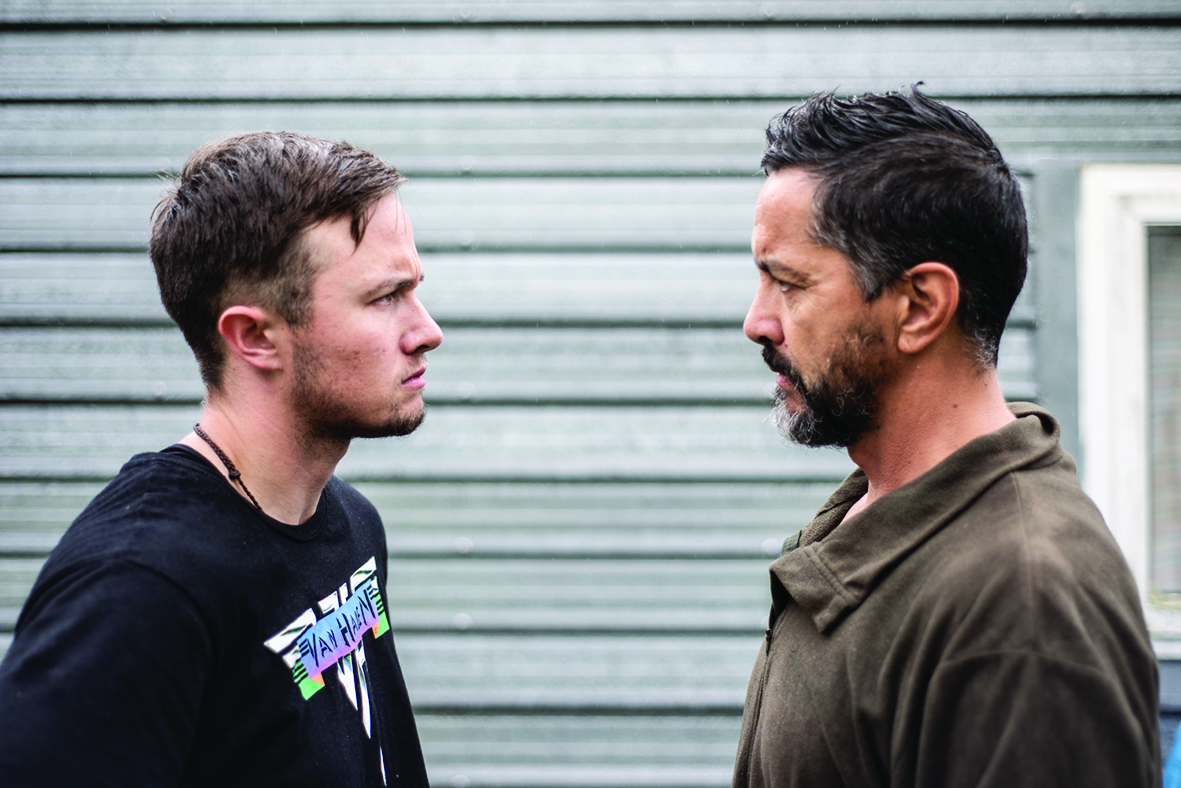The word ‘rural’ is pretty much right there in the name. Rūrangi is a (fictional) town in New Zealand, one seemingly like any other you may have seen from the nation’s relatively brief cinematic history. It is a place where dairy farms and processing factories dot the beautiful, green-pastured landscapes, and where you’re likely to have gone to school with the bloke who’s now fixing your car. It’s a place where men go to the pub after a hard day’s work on the farm, where you don’t lock your front door and where birthday gifts are purchased at the local op shop.
The story of Rūrangi (Max Currie, 2020) the film is one both from that part of the world and of that part of the world. Its story of a black sheep who has left town for the big city and who must return home to face the problems he once tried to escape is one that will, on its surface, carry an air of familiarity for audiences. But this isn’t a murder mystery like The Dry (Robert Connolly, 2020), or a comedic revenge fable like The Dressmaker (Jocelyn Moorhouse, 2015); rather, it is a soft-spoken story of identity and bonds, and of the chasm left in the wake of unspoken secrets.
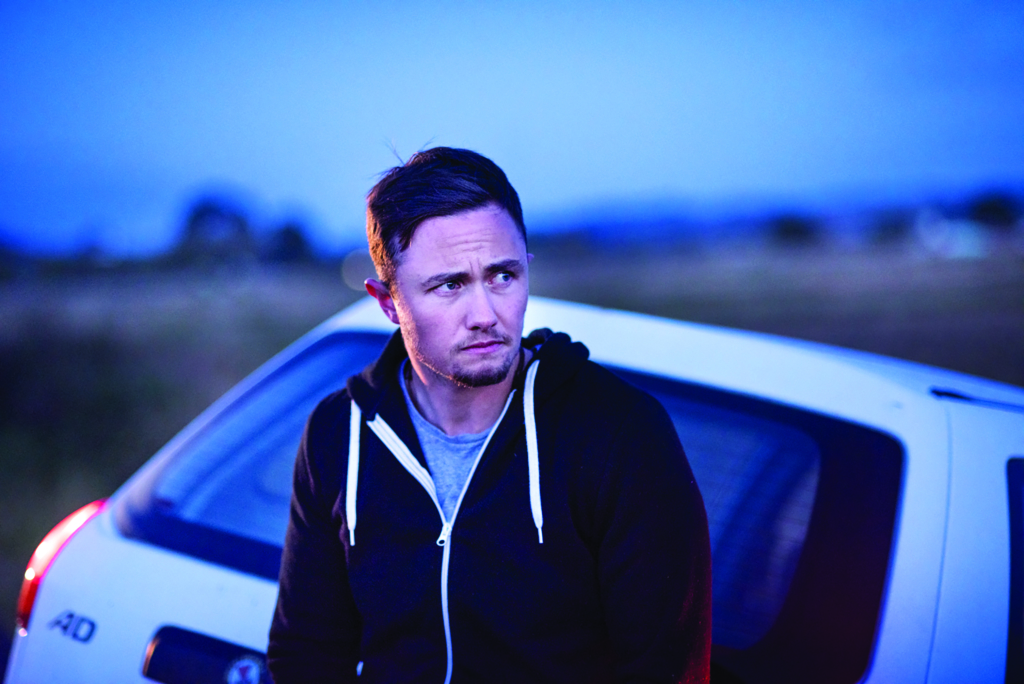
Farmer wants more than a wife
Yes, we’ve seen this story before, but rarely as authentically. Caz (Elz Carrad) is a transgender activist and community leader from Auckland who, in Rūrangi’s opening sequence, makes a call to his father from the side of a country road: ‘Dad, it’s me.’ Having left Auckland because of an as-yet-unknown tragedy, Caz is now stranded in the town that he fled ten years earlier, prior to his transition – not having even returned for his mother’s funeral – and his homecoming sparks at first confusion and then anger from dad Gerald (Kirk Torrance), fast acceptance from old best friend Anahera (Āwhina-Rose Henare Ashby), and a potential reignition of romance with old flame Jem (Arlo Green).
‘That’s what I liked about you – one of the things. You weren’t like the other girls,’ Jem says. ‘That’s because I wasn’t one,’ Caz replies, in one of the film’s best lines. Whatever Caz is avoiding back in Auckland, he cannot avoid the realities of his history in Rūrangi.
No matter the particulars of our coming-out story, there’s a persistent theme in how many of us, like Rūrangi’s Caz, have escaped the repressed small-town world of youth for a place where society is noticeably more open-minded.
For queer audiences – those of us anywhere along the LGBTQIA+ spectrum – Currie’s film will likely hold an even stronger resonance. No matter the particulars of our coming-out story, there’s a persistent theme in how many of us, like Rūrangi’s Caz, have escaped the repressed small-town world of youth for a place where society is noticeably more open-minded to sexualities and gender expressions beyond the world of Farmer Wants a Wife. But where some may mistake Rūrangi’s simplicity for a lack of drama, others will no doubt find themselves attached to its likeable characters as they raise contemporary issues in a clear-cut manner. Currie’s film treats its characters with empathy, intelligence and maturity, reflecting the quintessentially twenty-first century outlook of many contemporary rural populations.
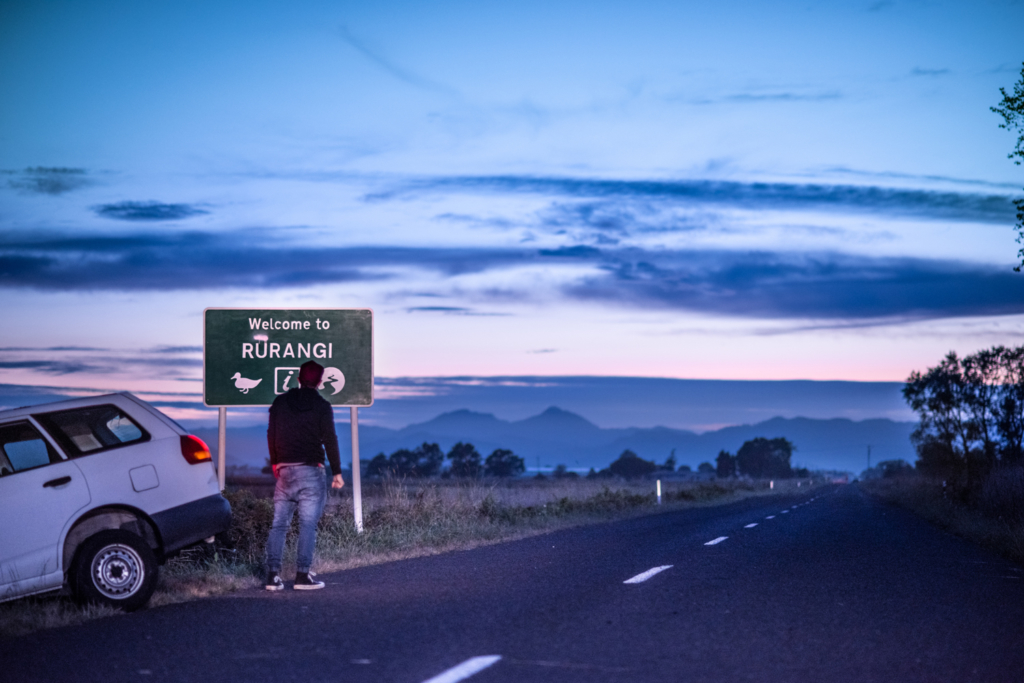
The bigger picture
This authenticity bubbles through in the make-up of the film’s creative team – well over half of whom identify as gender-diverse – and extends to the exclusive portrayal of transgender and non-binary characters by performers whose identity expression matches that of their on-screen persona. In fact, the film’s official website has even published a comprehensive statistical breakdown of its production staff in terms of pronoun use, sexual orientation, ethnicity and disability,[1]‘Statistics’, Rūrangi official website, <https://rurangi.com/statistics/>, accessed 2 August 2021. while production of the web series that the film emerged from was supported by an on-set internship program for gender-diverse people.[2]‘Internship Program’, Rūrangi official website, <https://rurangi.com/internship-program/>, accessed 2 August 2021.
‘It’s really, really important when you tell a story about a community that they have a central role in how it is told,’ Currie expressed in an interview with Radio New Zealand in July 2020. ‘If we’re going to tell a story about transgender people they absolutely need to tell the story.’[3]Max Currie, quoted in Kim Hill, ‘Celebrating Trans Experiences: Rurangi Director Max Currie’, Radio New Zealand, <https://www.rnz.co.nz/national/programmes/saturday/audio/2018754518/celebrating-trans-experiences-rurangi-director-max-currie>, accessed 2 August 2021. Co-written by transgender activist, teacher and writer Cole Meyers (who also served as co-producer), Rūrangi has clearly been born from a deeper understanding of its lead character than most cisgender individuals would be capable of possessing – and that matters.
And for transgender viewers in particular – those for whom representation on screen remains lacking, and, where it does exist, dominated by stories focused on transition and violence made by typically cisgender filmmakers – Rūrangi is a welcome addition to the ever-broadening canon, and a rare one from Aotearoa at that. It’s a film that elevates the concerns and the everyday lived experiences of transgender individuals beyond the easy drama of the brutality and cruelty they can encounter, while still acknowledging the often hard-fought lived experiences of those just wanting to exist and thrive. As Meyers puts it,
We’re not interested in seeing another story told about us, any more transition stories, trauma or tropes. These are so often about how other people see us, how other people experience us. We want to see stories on screen made by us.[4]Cole Meyers, in ‘Our Kaupapa’, Rūrangi official website, <http://rurangi.com/our-kaupapa/>, accessed 2 August 2021. Emphasis in original.
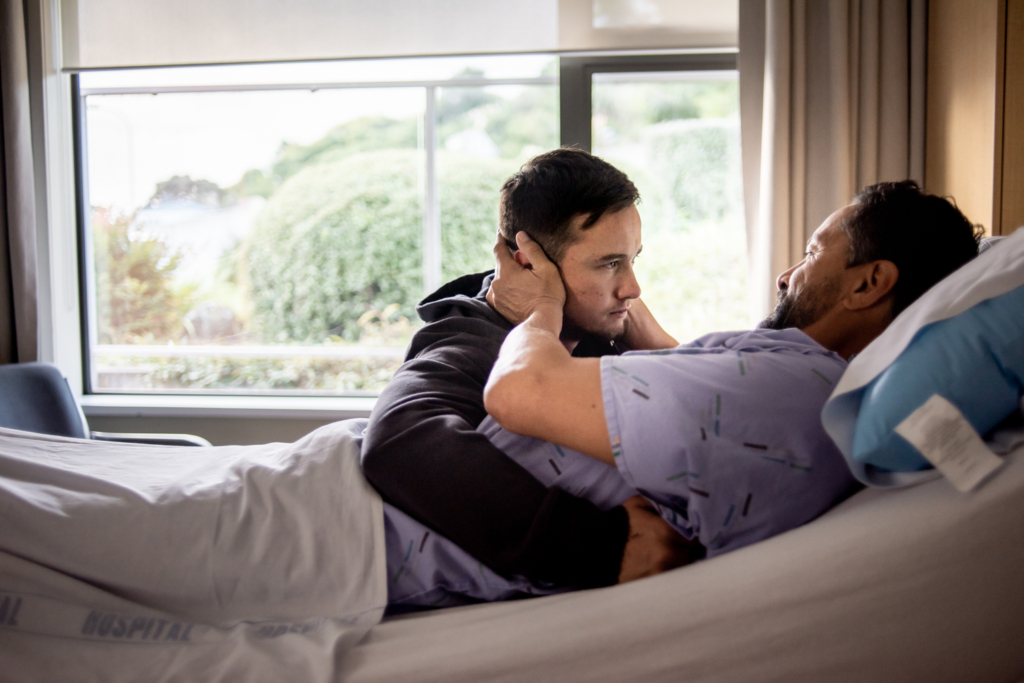
This film, with its genuine, reality-bound casting, comes at a time when people continue to debate the issue of straight or cisgender actors taking on LGBTQIA+ roles. Think: Colin Firth and Stanley Tucci in Supernova (Harry Macqueen, 2020); Kate Winslet and Saoirse Ronan in Ammonite (Francis Lee, 2020); Michelle Rodriguez in The Assignment (Walter Hill, 2016); or the controversies around features that have cast Scarlett Johansson[5]See Zack Sharf, ‘Scarlett Johansson Admits She “Mishandled” Transgender Rub & Tug Casting Controversy’, IndieWire, 26 November 2019, <https://www.indiewire.com/2019/11/scarlett-johansson-mishandled-transgender-rub-tug-casting-controversy-1202192304/>, accessed 25 April 2021. and Halle Berry[6]See Tyler Hersko, ‘Halle Berry Withdraws from Transgender Role in Upcoming Film’, IndieWire, 6 July 2020, <https://www.indiewire.com/2020/07/halle-berry-withdraws-transgender-role-upcoming-film-1234571656/>, accessed 26 April 2021. as transgender characters. Openly trans actor Carrad’s debut performance in Rūrangi never rings hollow or off-puttingly performative, in contrast to, say, cis male actor Eddie Redmayne’s performance as a trans woman in The Danish Girl (Tom Hooper, 2015). As a result, Carrad’s is not a performance that will breed breathless critical hyperbole about bravery and daring as it may have, once upon a time, for a non-transgender performer.[7]See, for example, Janet Maslin, ‘Boys Don’t Cry: Larger than Life, but Far, Far Away’, The New York Times, 1 October 1999, <https://archive.nytimes.com/www.nytimes.com/library/film/100199boys-film-review.html>, accessed 2 August 2021. Nonetheless, his mere presence lends Rūrangi a weight that it otherwise would have lacked – particularly in how, through his performance, the relationship between Caz and Jem grows into the film’s most memorable and charming subplot.
Without queer creatives in front of as well as behind the camera – especially for films of such intimate dimensions as Currie’s – cinema is missing a brilliant opportunity to expand its range and its reach.
While I do not necessarily subscribe to the view that only LGBTQIA+ performers can or should play LGBTQIA+ characters, I do think it is hard to deny that, without queer creatives in front of as well as behind the camera – especially for films of such intimate dimensions as Currie’s – cinema is missing a brilliant opportunity to expand its range and its reach. Response elsewhere to the US TV series Pose, for instance, or the Oscar-winning Chilean drama A Fantastic Woman (Sebastián Lelio, 2017), among others, shows that authentic casting is increasingly giving stories like these impact beyond mere lip service. And Rūrangi’s significance in this regard extends even beyond the four edges of the screen: the film comes with its own social media campaign, #ByUsAndAboutUs, which expresses an unambiguous message about the making of queer art.
From online to the big screen
It is true though that, in terms of its craft, Rūrangi is a relatively humble film. Audiences expecting something more overtly queer in aesthetic – along the lines of, say, New Zealand period melodrama Desperate Remedies (Stewart Main & Peter Wells, 1993) – won’t find that here. Rūrangi’s technical aspects are modest, which is probably to be expected given that the feature film actually began life as a web series. While it’s true that there is little divide these days between independent cinema and projects developed for the internet, I would have liked a greater exploitation of the eye-catching natural scenery and Auckland street scenes.
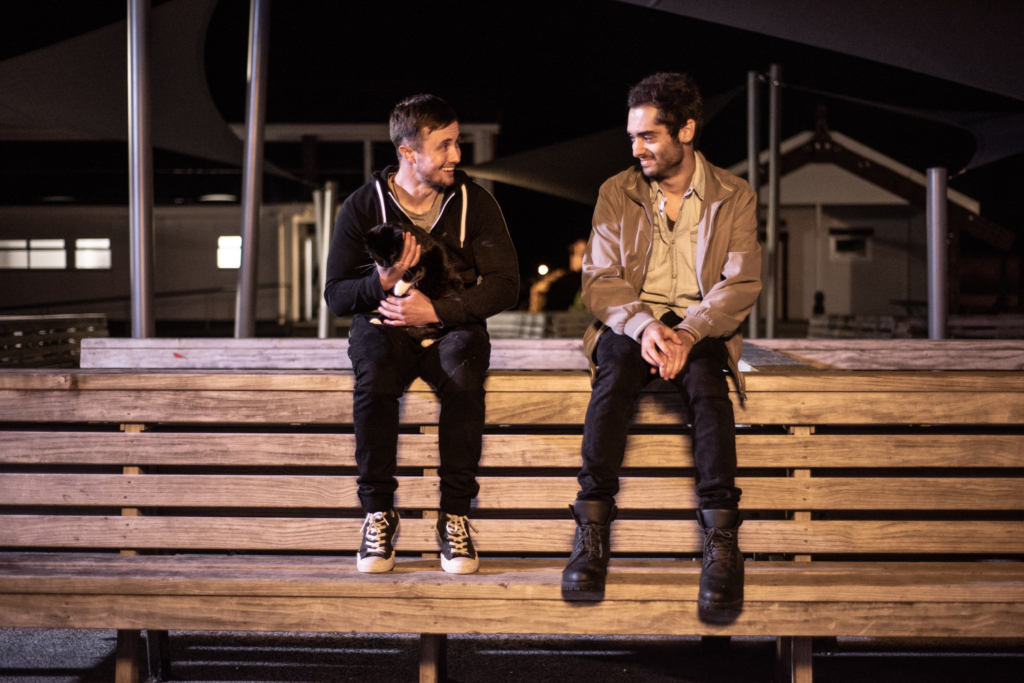
This transition between mediums appears to have had noticeable benefits, however. Episode guides suggest that Currie and editors Brough Johnson and Dan Kircher have done more for the feature version than simply stringing the five episodes one after another. In the film, Caz’s life in Auckland – including his secret affair with a high-profile rugby star and the street activism he participates in – is interspersed throughout the story instead of appearing sequentially, as it does in the web series. This gives the feature a less devoutly linear approach than its online counterpart, and adds dramatic thrust to its narrative. The thornier elements of what exactly brought Caz back to his home town aren’t explored enough in the feature version to have a significant impact beyond plotting necessity, but the rejig at the very least recognises differing audience expectations regarding big-screen and small-screen narratives.
That divide may also explain how some of Rūrangi’s clumsier elements got through the writing process. For example, its metaphors lean towards being a bit too obvious. In one of the film’s subplots, Gerald is spearheading a campaign to change the use of pesticides following his wife’s death from cancer. His farming colleagues reject this shake-up of how they go about business, only to show signs of coming around to the idea once they see the results. It’s not hard to see the correlation with Gerald’s own bull-headed treatment of Caz.
Elsewhere, the character of a villainous councillor, Colleen Richter (Renee Lyons), who deliberately attempts to publicly embarrass and deadname[8]The act of referring to a transgender person by their pre-transition name. See KC Clements, ‘What Is Deadnaming?’, Healthline, updated 18 September 2018, <https://www.healthline.com/health/transgender/deadnaming>, accessed 2 August 2021. Caz in the film’s climax, needed more time to be properly developed. For an antagonist with such a pivotal role in what ultimately becomes Caz’s big homecoming-out moment, her absence through the bulk of the narrative, and lack of time given to developing her bigoted motivation, is notable. As an audience, we may cheer Caz on; but, dramatically, this narrative arc doesn’t quite satisfy.
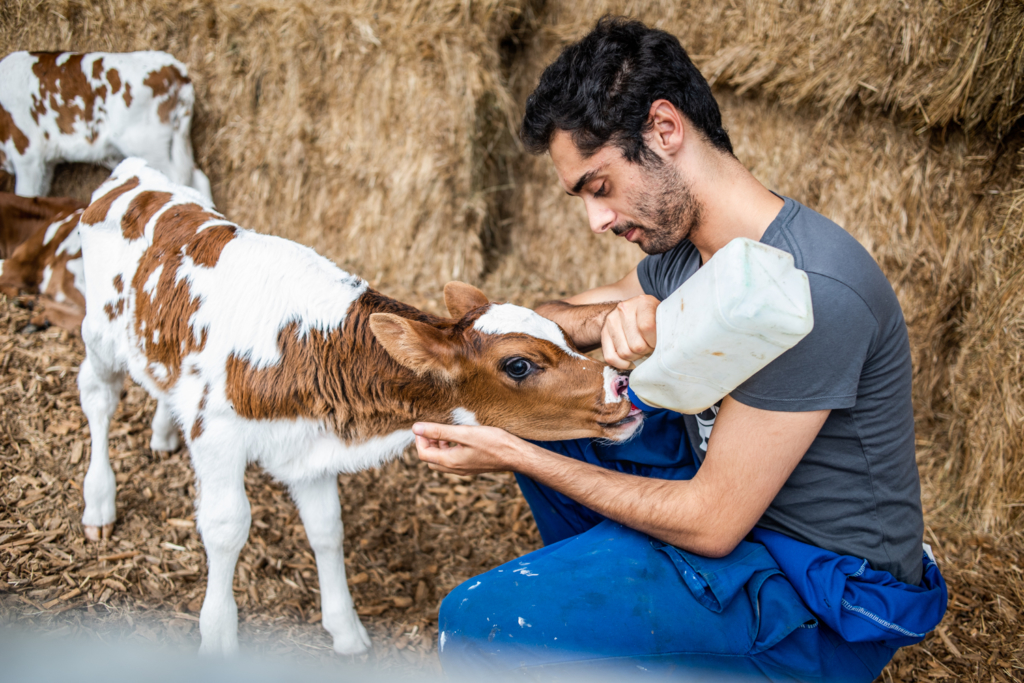
More than just one identity
The themes of identity explored in Rūrangi aren’t just left for Caz. In another of the film’s interesting strands, Anahera explores her own sense of self as a lesbian as well as her desire to grow closer to her ancestral roots. She is labelled a ‘plastic Maori’ by a local because – like many First Nations people in New Zealand and around the globe[9]See Nick Martin, ‘What’s Lost When a Language Disappears’, The New Republic, 13 December 2019, <https://newrepublic.com/article/155913/native-american-languages-disappearing-reauthorization-act-congress>, accessed 2 August 2021. – she can’t speak the language or participate in the customs.
While the story doesn’t explicitly go into this, Anahera is another target of the long roots of colonialism. I would have liked to have seen this explored further. Jem, too, appears to have a complicated story, along with a wealth of internal thoughts that hint at rich dramatic material (when he isn’t being portrayed as a bumbling goof, an unnecessary character trait). Considering the Maori people have their own long history with queer identity through the term takatāpui[10]‘Trans 101: Glossary of Trans Words and How to Use Them’, Gender Minorities Aotearoa website, <https://genderminorities.com/database/glossary-transgender/>, accessed 24 April 2021. – comparable to other First Nations concepts around queerness that are found elsewhere in the world, such as two-spirit[11]See Walter L Williams, ‘The “Two-spirit” People of Indigenous North America’, The Guardian, 11 October 2010, <https://www.theguardian.com/music/2010/oct/11/two-spirit-people-north-america>, accessed 2 August 2021. in North America and sister girls and brother boys[12]See Hayden Moon, ‘Brotherboys and Sistergirls: We Need to Decolonise Our Attitude Towards Gender in This Country’, Junkee, 20 July 2020, <https://junkee.com/brotherboy-sistergirl-decolonise-gender/262222>, accessed 2 August 2021. in Australia – and that recipients of that designation held revered positions within Maori society long before colonisation,[13]See Clive Aspin, ‘Page 3. Sexual Diversity in Contemporary Māori Society’, in ‘Hōkakatanga – Māori sexualities’, Te Ara – The Encyclopedia of New Zealand, 5 May 2011, <http://www.TeAra.govt.nz/en/hokakatanga-maori-sexualities/page-3>, accessed 2 August 2021. perhaps this is another facet of this central trio’s life that could have been explored with deeper complexity in the film.
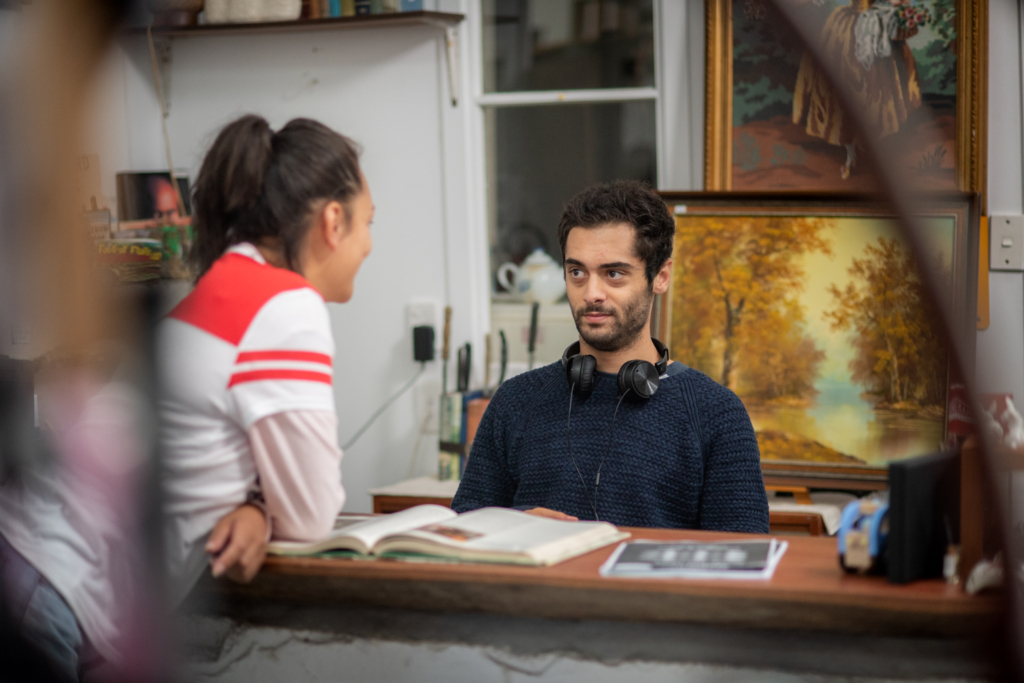
It’s good news, then, that a sequel project has already been announced.[14]See Andreas Wiseman, ‘Hulu Picks Up U.S. Rights to New Zealand Transgender Drama Rurangi’, Deadline, 8 March 2021, <https://deadline.com/2021/03/hulu-new-zealand-transgender-drama-rurangi-streaming-1234708883/>, accessed 2 August 2021. This comes on the back of Series 1 of the project’s web-series version having been acquired by Hulu,[15]ibid. the Disney-owned streaming platform for content deemed less family-friendly (such as the gay-themed high school series Love, Victor).[16]See Brett White, ‘It’s Clear Why Love, Victor Was Moved to Hulu from Disney+ – and It’s Not the Gay Stuff’, Decider, 17 June 2020, <https://decider.com/2020/06/17/love-victor-hulu-too-hot-for-disney-plus/>, accessed 5 August 2021. No word yet on where this new instalment’s narrative will go, but there are plenty of rich areas for Currie and Meyers to expand upon in future stories from their Rūrangi universe (even if it is a small one). Wherever it goes, I look forward to seeing it; Currie has proven that he can handle these themes with delicacy and has a voice worth listening to.
‘Most people are just idiots about other people’s sexuality,’ says Anahera at one point in the film. Hopefully, a work like Rūrangi can change that status quo just a little bit, for those viewers open enough to its truths and charms.
Endnotes
| 1 | ‘Statistics’, Rūrangi official website, <https://rurangi.com/statistics/>, accessed 2 August 2021. |
|---|---|
| 2 | ‘Internship Program’, Rūrangi official website, <https://rurangi.com/internship-program/>, accessed 2 August 2021. |
| 3 | Max Currie, quoted in Kim Hill, ‘Celebrating Trans Experiences: Rurangi Director Max Currie’, Radio New Zealand, <https://www.rnz.co.nz/national/programmes/saturday/audio/2018754518/celebrating-trans-experiences-rurangi-director-max-currie>, accessed 2 August 2021. |
| 4 | Cole Meyers, in ‘Our Kaupapa’, Rūrangi official website, <http://rurangi.com/our-kaupapa/>, accessed 2 August 2021. Emphasis in original. |
| 5 | See Zack Sharf, ‘Scarlett Johansson Admits She “Mishandled” Transgender Rub & Tug Casting Controversy’, IndieWire, 26 November 2019, <https://www.indiewire.com/2019/11/scarlett-johansson-mishandled-transgender-rub-tug-casting-controversy-1202192304/>, accessed 25 April 2021. |
| 6 | See Tyler Hersko, ‘Halle Berry Withdraws from Transgender Role in Upcoming Film’, IndieWire, 6 July 2020, <https://www.indiewire.com/2020/07/halle-berry-withdraws-transgender-role-upcoming-film-1234571656/>, accessed 26 April 2021. |
| 7 | See, for example, Janet Maslin, ‘Boys Don’t Cry: Larger than Life, but Far, Far Away’, The New York Times, 1 October 1999, <https://archive.nytimes.com/www.nytimes.com/library/film/100199boys-film-review.html>, accessed 2 August 2021. |
| 8 | The act of referring to a transgender person by their pre-transition name. See KC Clements, ‘What Is Deadnaming?’, Healthline, updated 18 September 2018, <https://www.healthline.com/health/transgender/deadnaming>, accessed 2 August 2021. |
| 9 | See Nick Martin, ‘What’s Lost When a Language Disappears’, The New Republic, 13 December 2019, <https://newrepublic.com/article/155913/native-american-languages-disappearing-reauthorization-act-congress>, accessed 2 August 2021. |
| 10 | ‘Trans 101: Glossary of Trans Words and How to Use Them’, Gender Minorities Aotearoa website, <https://genderminorities.com/database/glossary-transgender/>, accessed 24 April 2021. |
| 11 | See Walter L Williams, ‘The “Two-spirit” People of Indigenous North America’, The Guardian, 11 October 2010, <https://www.theguardian.com/music/2010/oct/11/two-spirit-people-north-america>, accessed 2 August 2021. |
| 12 | See Hayden Moon, ‘Brotherboys and Sistergirls: We Need to Decolonise Our Attitude Towards Gender in This Country’, Junkee, 20 July 2020, <https://junkee.com/brotherboy-sistergirl-decolonise-gender/262222>, accessed 2 August 2021. |
| 13 | See Clive Aspin, ‘Page 3. Sexual Diversity in Contemporary Māori Society’, in ‘Hōkakatanga – Māori sexualities’, Te Ara – The Encyclopedia of New Zealand, 5 May 2011, <http://www.TeAra.govt.nz/en/hokakatanga-maori-sexualities/page-3>, accessed 2 August 2021. |
| 14 | See Andreas Wiseman, ‘Hulu Picks Up U.S. Rights to New Zealand Transgender Drama Rurangi’, Deadline, 8 March 2021, <https://deadline.com/2021/03/hulu-new-zealand-transgender-drama-rurangi-streaming-1234708883/>, accessed 2 August 2021. |
| 15 | ibid. |
| 16 | See Brett White, ‘It’s Clear Why Love, Victor Was Moved to Hulu from Disney+ – and It’s Not the Gay Stuff’, Decider, 17 June 2020, <https://decider.com/2020/06/17/love-victor-hulu-too-hot-for-disney-plus/>, accessed 5 August 2021. |
